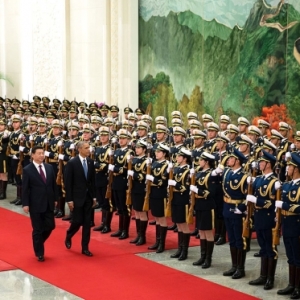Those opposed to counteracting climate change have long feared that any American action would be useless in the face of continued mass pollution abroad. However, last week’s announcement that China and the United States are collaborating on the most significant deal in history to limit carbon emissions proves this cynical outlook wrong. As a veteran and an American, I’m proud to see my country leading the way to combat one of the most significant challenges of our time.
Recognizing the need to act ahead of the upcoming international negotiations on climate change, the U.S. announced its plan to reduce carbon emissions by 26 to 28 percent below 2005 levels by 2025. In return, for the first time ever, China has set a hard date on when they will peak their carbon emissions and pledged to try and reach that peak earlier. In addition, China has set aggressive targets for low carbon-emission energy production, planning to produce 1,000 gigawatts via non-coal sources by 2030—an amount equivalent to all of the electricity produced by the United States.
The fact that China has accounted for 60% of the growth in global CO² emissions over the past 15 years underscores the importance of bringing them to the table and reaching a hard commitment. China is the world’s leading greenhouse gas emitter and has served as a barrier to other developing countries like India making commitments in the past. With this deal, however, the United States and China have set a framework for all countries to model.
As a veteran of the U.S. Army, I welcome this news. Our military leaders have already declared climate change a “threat multiplier,” increasing instability and risk around the globe. Whether it is to fight against extremist groups controlling dwindling resources in unstable countries or answer those in need of urgent humanitarian aid after severe weather events, the U.S. Armed Forces is increasingly called upon to respond to the challenges of climate change.
Unfortunately, to the fiercest opponents of climate action, both the good news of the week and the security imperative are meaningless. Climate change deniers in Congress are already characterizing the agreement as “job-crushing,” “devastating,” and “hollow and not believable.” It is time for our nation—and the world—to leave this quarrelsome minority behind, and an international agreement of this magnitude is a great sign that we’re moving forward with or without their cooperation.
Americans should feel proud of this deal because it demonstrates that our leadership abroad produces results. Naysayers will keep repeating their same, tired talking points, but the simple fact is that when America acts, the world follows. It is imperative that the United States continues to keep taking steps forward to both maintain our nation’s position as a world leader and increase global stability and security.

